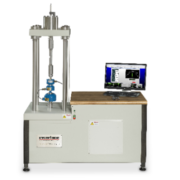Overlapping Material Science and Force Measurement
 From bridges to medical devices, material science is the foundation of countless industries, driving innovation and ensuring safety and reliability. At its core, material science involves understanding the properties of materials and how they behave under different conditions. This knowledge is crucial for selecting the right materials for specific applications and ensuring the quality and longevity of products and components.
From bridges to medical devices, material science is the foundation of countless industries, driving innovation and ensuring safety and reliability. At its core, material science involves understanding the properties of materials and how they behave under different conditions. This knowledge is crucial for selecting the right materials for specific applications and ensuring the quality and longevity of products and components.
Material science encompasses a wide range of materials with unique properties and applications. Its researchers explore a spectrum of possibilities, from the strength and conductivity of metals like steel and aluminum to the versatility and moldability of plastics. They also delve into the intricate world of textiles, developing innovative fabrics with enhanced performance and comfort.
Biomaterials, a frontier of material science, are revolutionizing healthcare with biocompatible implants and tissue regeneration. And then there are composites, ingenious combinations of different materials that offer superior properties, like the lightweight strength of carbon fiber-reinforced polymers. This breadth of materials provides endless opportunities for innovation and problem-solving across countless industries.
Why is Force Measurement So Important in Material Science?
Force measurement is critical in material science because it provides precise data on how materials respond to various forces. Researchers and engineers can accurately measure tensile strength, compressive strength, fatigue life, and other key properties using load cells and sensor technologies. This data is essential for a wide range of test and measurement applications in material science, including:
- Validating material suitability: Does the material have the strength and durability required for its intended use? Force measurement provides the definitive answer.
- Ensuring quality control: Consistent material properties are crucial for manufacturing reliable products. Force measurement helps identify variations and maintain high standards.
- Understanding material behavior: How does the material deform under stress? When will it fracture? Force measurement reveals these critical behaviors.
- Meeting regulatory standards: Many industries have strict safety and performance requirements. Force measurement ensures materials comply with these standards.
Force Measurement in Material Science Applications
Material science isn’t confined to a single industry; it supports innovation across a vast spectrum. It is everywhere, from the lightweight composites revolutionizing space exploration to the 4D bioprinting-compatible materials driving advancements in healthcare.
Test and measurement using load cells are essential for understanding various durable polymers utilized in consumer goods, understanding the high-performance alloys that enable faster cars, and predicting the long-term behavior of the resilient concrete forming our infrastructure.
In aerospace, engineers rely on force measurement to validate the strength and fatigue life of lightweight alloys used in aircraft components, often employing low-profile and miniature load cells in their testing equipment. The automotive industry utilizes force measurement to evaluate bumpers’ impact resistance and ensure the structural integrity of vehicle frames. Medical device manufacturers depend on high-accuracy load cell technologies to assess the flexibility and durability of catheters and stents. In the consumer goods industry, force measurement helps determine the tensile strength of plastics used in packaging and the resilience of fabrics in clothing.
Force Measurement Solutions from Interface for Material Testing
Interface offers a wide range of force measurement solutions for material testing, including:
- Compact, versatile, LowProfile load cells, including our 1200 Standard Precision Universal LowProfile Load Cell, provide precision accuracy and are ideal for integration into various testing machines.
- The Miniature Load Cells series, including our beams and s-types, are perfect for testing small components or applications with limited space. Review the Interface Mini™ Load Cell Selection Guide to explore the best sensors for your test and measurement project.
- Data Acquisition Systems capture and analyze force data in real time, providing valuable insights into material behavior. Use our Data AQ Pack Guide to review your options.
The Future of Material Science
The future of material science is bright. Growth is fueled by advancements in fields like biomaterials, whose global market is expected to reach $254 billion by 2026, and 3D bioprinting, whose market size is projected to reach $6.9 billion by 2032. Additionally, material science plays a crucial role in sustainability, with 70% of new aircraft projected to incorporate composite materials by 2025 to reduce their environmental impact.
MaterialTesting_InfographicPosterInterface is committed to providing innovative and reliable force measurement solutions that meet the evolving needs of this dynamic field. Accurate and dependable measurements are crucial for making informed decisions about material selection and ensuring product quality.
ADDITIONAL RESOURCES
Interface Load Cells 501 Materials and Process Control Testing Guide
Force Measurement is Fundamental in Material Testing
Interface Solutions for Material Testing Engineers







